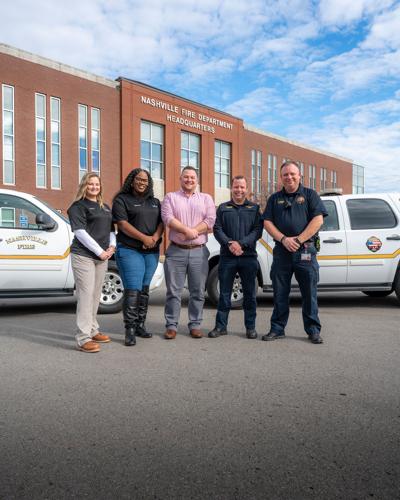
Some of the REACH team, from left: Kelsey Taylor, Kiara Haynes, Michael Randolph, Capt. Jerry Pradines, Capt. Chad Walker
Nashville’s newest 911 option, Responders Engaged and Committed to Helping (REACH), is set to finish its pilot phase at the end of June after hitting the streets for the first time in February 2023. The co-response program, which pairs paramedics from the Nashville Fire Department and clinicians from Mental Health Coop, was tasked with responding to nonviolent mental health crises and, in turn, freeing up some ambulances and emergency room space.
Leaders of the program Brooke Haas, commander of EMS operations at the Nashville Fire Department, and Michael Randoph, director of co-response, are eyeing an expansion. The REACH program currently staffs two clinicians and two paramedics Tuesday through Friday, 10 a.m. to 8 p.m. At a May 7 Public Health and Safety Committee meeting, Haas said the department would like to double the number of staff for the program to increase coverage, as well as add a manager. The fire department is requesting $750,000 to complete the task, part of the department’s budget that is awaiting approval by the Metro Council.
From Feb. 13, 2023, to Feb. 29, 2024, REACH responded to 618 calls and 530 unique patients (48 interacted with the program more than once) — a rough average of three calls per day. Of those calls, 38 percent were still transported to an emergency department, while 22 percent went to Mental Health Coop’s Crisis Treatment Center, 11 percent were transported to inpatient care, and 18 percent stayed at the site but were given resources and referrals. In REACH’s purview, the responses were concentrated in the downtown core, with activity in the southeastern and northeastern parts of Davidson County.
Most of the people REACH responded to were suicidal — 69 percent. Around a third were unhoused or staying at a shelter (31 percent), and 18 percent stayed in group or transitional housing, while 48 percent owned or rented. In addition, 57 percent were insured by TennCare or Medicare, 12 percent had private insurance, 2 percent were uninsured, and 30 percent unreported.
The Department of Emergency Communications was fairly effective in its assessment of when to dispatch REACH: Twelve percent of calls ultimately required police presence, and just two cases resulted in arrests.
While the city’s police co-response program, Partners in Care, releases data snapshots to the city’s website, Joseph Pleasant, spokesperson for the Nashville Fire Department, tells the Scene the REACH data will not be shared online. (Those who keep an eye on public meetings, however, will catch updates in the Behavioral Health and Wellness Advisory Council meetings.)
REACH pilot program releases Q3 results, Partners in Care to expand to all police precincts
Randolph says there wasn’t a specific percentage goal for emergency room diversions going in, but anticipates the 38 percent number will improve. Some calls had medical needs on top of their psychiatric crisis, so a trip to the emergency room was unavoidable, he explains. He says he is especially proud of the statistic of 22 percent going directly to the Mental Health Coop Crisis Treatment Center.
“I think it is an incredible statistic, because these are people who would have called an ambulance, got an ambulance bill, gone to the emergency room, would have to tell their story over and over again,” Randolph says. “They’d be charged for the ER visit. Not only does it save money for the health care system, but it also helps that person get help faster and get the correct help. ... And hopefully get them out of a state of crisis and back into their normal lives as fast as possible.”
Stephen Martini, director of the Department of Emergency Communications, says the nearly 40 percent of emergency room runs among REACH calls is an improvement over what would have been 100 percent ambulance responses before the program started.
“If you get in the ambulance, you’re going to the hospital,” Martini says. “We’re already light-years better than we were, even a year in, because we’re connecting people who are experiencing nonviolent psychological incidents with care on a variety of levels — whether that’s a return to home, return to a group home or connected to another solution.”
As the program looks to expand, Randolph anticipates he will not have a problem finding clinicians interested in this new and burgeoning field of co-response.
“I think people are really interested, and we haven’t had any problems filling the positions,” he says. “But it’s really kind of niche work, and we want to train people really well, because the quality of services delivered is always something to be mindful of, and we want to make sure that we only train the best counselors and we train them really well to help the people in Nashville.”






